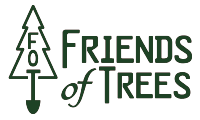Tag: APANO
Get to Know our partner, APANO
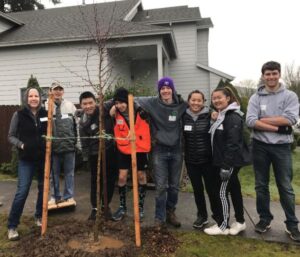
The Asian Pacific American Network of Oregon operates under the principal we are stronger together
APANO’s Policy Director Richa Poudyal talks about APANO’s goals for the Robert Wood Johnson Foundation project:
What is the #1 thing readers should know about APANO?
APANO envisions a just world where Asians and Pacific Islanders and communities who share our aspirations and struggles have the power, resources, and voice to determine our own futures, and where we work in solidarity to drive political, social, economic, and cultural change. For climate justice work, we are striving for BIPOC communities in Oregon to exercise self-determination to make decisions about how to move towards a more regenerative economy. We do this work in coalition and side by side with community members most impacted by the impacts of climate change.
Why is APANO involved in the Robert Wood Johnson Foundation project?
Within climate justice work, APANO is very interested in creating spaces and structure for place-based community organizing and advocacy. The RWJF project is such a special collaboration between Friends of Trees, PSU, and APANO; it’s collaborations like these that allow multiple organizations to contribute their respective strengths and power to support community members in achieving self determination around greening and localized climate justice work. APANO is so grateful to be a part of this project and to bring a community organizing lens and approach to greening outer East Portland, and to work with Friends of Trees which has the community connections, advocacy skills, and know-how around connecting to and planting trees as a part of a conservation and greening strategy.
What’s the community response to this project?
We are two months into our 12 month project, and are working with an incredible group of twelve community members who live in outer East Portland. Since the kick off of the project has coincided with the heat wave we’ve faced in Portland this year, much of the feedback so far has been around being glad to have a space to do something tangible and locally to actively tackle heat and air quality impacts of climate change that have already been prevalent for our neighbors in outer East Portland. Folks have also expressed gratitude to have the space to connect with others and grieve and process the changes in the land and air around us, mostly caused by humans.
What is the top result APANO would like to see from this project?
For APANO, the primary result that we want to see is community feeling empowered and resourced to both advocate for community-sourced solutions and to create and put forward solutions themselves, outside traditional decision-making institutions.
Thank you Richa! Learn more about APANO.
photo: APANO + Friends of Trees planting event in east Portland
An update on our Robert Wood Johnson Foundation partnership
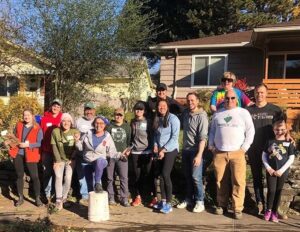
Engaging Community to Take Climate Action
We know that trees fight climate change. And here at Friends of Trees our experience partnering with thousands of community members tells us that the volunteer experience also helps fight climate change – because folks who volunteer to plant and care for trees often go on to become involved with other environmental issues, including taking climate action.
We’re excited to share that through our partnership with the Robert Wood Johnson Foundation, APANO (Asian Pacific American Network of Oregon), Portland State University’s Toulan School of Urban Studies and Planning, OHSU-PSU Joint School of Public Health, and Willamette Partnership, we should soon have quantitative and additional qualitative data to support this. This project recognizes that “where one lives or works, one’s age, if one has pre-existing health conditions or chronic illnesses, and race or income all impacts how and how much climate change harms health.” Friends of Trees’ efforts over the past 20+ years of planting in east Portland and other low-canopy, underserved neighborhoods also recognizes this, and this partnership takes these efforts to the next level, especially around community involvement.
“Engaging with historically marginalized communities about where neighborhood change needs to happen and how it might happen are the first steps to ensuring an equitable urban forestry program.”
– Dr. Vivek Shandas, PSU, School of Urban Studies
A major project milestone is the formation of a community advisory board, facilitated by APANO, and comprised of people who live in, work in, or regularly engage with east Portland’s Jade District. Participants include a Friends of Trees tree recipient, a PSU student, a middle school student, a Rosemary Anderson High School/POIC graduate, a biology educator, and Multnomah County representation. Upcoming CAB activities include a live tree walk in the Jade District, exploring topics such as infrastructure challenges to adding trees (e.g., with so many parking lots, where and how do we plant trees?) and how to address these challenges.
“What’s really exciting about this project is the community advisory board, which isn’t something we usually have the resources to develop.” Michelle Yasutake, Friends of Trees Green Space Program Manager
Michelle’s project role involves a major project milestone, the formation of a community advisory board, facilitated by APANO, and comprised of people who live in, work in, or regularly engage with east Portland’s Jade District. Dr. Shandas is also a strong supporter of direct community involvement, “By integrating community voices with our technical know-how, this project is identifying ‘nature-based solutions’ in areas that have been neglected and disinvested by regional decision makers.”
Friends of Trees wants to do even more to engage people in the community in project planning and prioritizing, and we know that the best way to achieve diverse and authentic representation is to be able to provide stipends in consideration of the time it takes people to participate. The Robert Wood Johnson Foundation recognizes the value of this and its grant includes funding for these stipends. Michelle further emphasizes the importance of community involvement,
“This project, and the community advisory board, are so important to Friends of Trees’ goals around equity, diversity and inclusion and our efforts to genuinely work with the people who actually live and work in the community, and to do so in a way that ensures community members feel like they are truly a part of the process.”
Next steps in the project include data collection through surveying the community; we’re asking questions about neighborhood involvement, civic engagement such as voting, the impact of COVID on household income, and more. We’ll also take on a tangible project such as adding green infrastructure (trees, bioswales, shrubs) to a site identified as a priority by the community; and we’ll be using a research tool called Photovoice.
Photovoice is a hands-on, photography-based research method designed to help community members identify and discuss important community issues and take social action. Photovoice involves using cameras/smartphones to visually document, describe, and discuss important community concerns.
For this Photovoice project, adult and youth community residents will use photography and digital mapping to collaboratively identify and map out important climate, greenspace, and community health concerns—centering the perspectives of residents of East Portland and the Jade District. This will include identifying specific places and spaces that represent important locations of daily climate and greenspace experiences. The goal is to create new local climate and community health data that prioritizes community lived experience and knowledge, such that the data can be used to respond to specific community concerns.
The purpose of this partnership is to “Examine the physical and social dimensions of a tree planting program as a strategy to improve public health and mitigate climate change.” East Portland is one of seven communities across the country where RWJF is studying health, health equity and climate change solutions through its Culture of Health Action Framework, marking RWJF’s first foray into climate health solutions. As this project progresses we’ll share more milestones and updates, so stay tuned!
Photo at top: Friends of Trees East Portland tree planting event, November 2019.
Support our community partners
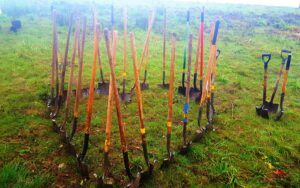
If you viewed any of our Earth Month events (here’s the playlist) you probably noticed that we often talk about partnerships and climate justice. Friends of Trees’ community includes partnerships with a number of truly impactful local organizations that work with underserved communities. Underserved communities experience the worst effects of climate change and our partnerships that help connect communities to the benefits of trees play an important role in achieving climate justice.
We have a special request of you: Support our community partners. Yes, Friends of Trees will always need you, but if we are going to achieve true climate justice we all need to support Black, Indigenous or People of Color (BIPOC) organizations that are part of the movement to ensure equitable outcomes around trees and the urban canopy.
These organizations are Friends of Trees’ partners and need your support:
Asian Pacific American Network of Oregon (APANO): Uniting Asians and Pacific Islanders to achieve social justice.
The Blueprint Foundation: Uplift, educate, and support the development of black-identified youth and other communities of color.
Portland Opportunities Industrialization Center (POIC): Committed to the success of underserved youth and adults.
Wisdom of the Elders: Native American cultural sustainability, multimedia education and race reconciliation.
If you’d like to learn more about how Friends of Trees partners with these organizations visit our website here.
Thank you for supporting our work and the work of our partners, and for being a part of the Friends of Trees community.
Partnering with APANO and others on the Jade Greening Project
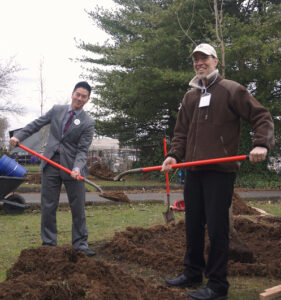 The Jade District in outer southeast Portland is one of the most ethnically and racially diverse census tracts in Portland, home to the city’s largest concentration of Asian Americans. The Jade District also experiences significant environmental health disparities, stemming from exposure to air toxins and lack of walk-ability/accessibility.
The Jade District in outer southeast Portland is one of the most ethnically and racially diverse census tracts in Portland, home to the city’s largest concentration of Asian Americans. The Jade District also experiences significant environmental health disparities, stemming from exposure to air toxins and lack of walk-ability/accessibility.
As part of the Jade Greening Project, Jade residents and community partners, including Friends of Trees, explored these issues and how to address them. We walked the Jade District, venturing into side streets and residential areas, making critical observations. Actions and strategies were informed by issues of equity and environmental justice, a commitment to engaging community voices, and ways to ensure the greening and revitalization– and not the gentrification- of the Jade District.
Friends of Trees’ involvement will contribute to the successful greening of the Jade District through continuing our tree-planting events in the area; translating materials for more successful outreach; offering leadership training opportunities so community members can get involved in neighborhood tree-plantings; offering additional tree planting opportunities along neighborhood greenways and safe routes to school; and, working with partners including APANO, OPAL, Portland Bureau of Environmental Services, Portland Parks and Recreation Urban Forestry and Jade District residents to raise awareness about the importance of a healthy urban forest to a healthy community.
Friends of Trees was honored to participate in the signing ceremony for this project through planting two trees (Princeton sentry ginkgo and Chinese pistache) to kick-off the greening, a fitting reflection of what it means to grow community.
